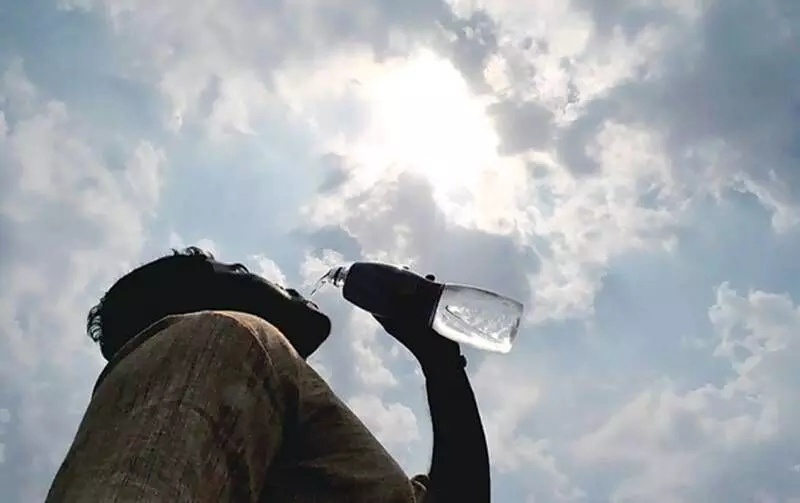Climate change fears come true as country witnesses another spell of heat wave
Heat waves scorching parts of India during the summer season is not unheard of but temperature rising above 40 degrees celsius during the middle of March seems to be an unprecedented phenomenon. After a brief respite for a week, the country is now gearing for another episode of intense heat. Here's how climate change is making its presence felt in India' summer season this year.
 गाँव कनेक्शन 30 March 2022 8:43 AM GMT
गाँव कनेक्शन 30 March 2022 8:43 AM GMT

For those wondering if scorching heat in the beginning of the summer season is an exceptional case this year and won't become a regular trend in the coming years, there's bad news.
According to experts analysing weather in the light of the rising global temperatures due to global warming, breaking of high temperature records for the summer months is a phenomenon which will be witnessed regularly in the coming years.
"While we expect the heatwave to hit parts of central and northwest India by the end of March but so early (around March 15) in the season was not expected," Mahesh Palawat, vice president, Meteorology and Climate Change, Skymet Weather was quoted in a press briefing prepared by Climate Trends — a Delhi based climate advocacy group.
"But I would also not be surprised, as we have been witnessing a gradual rise in day temperatures for the last few years. Maximum temperatures breaking records are now here to stay with rise in global mean temperatures," the expert added.
As per a press release by the India Meteorological Department (IMD) issued at 1 pm on March 30, yesterday, on March 29, maximum temperatures were 41-42°C (degrees celsius) in most parts over western Rajasthan, western Madhya Pradesh Vidarbha, Madhya Maharashtra, Marathwada and 40-41°C in many parts over eastern Uttar Pradesh, Rayalaseema & Telangana; in some parts over Gangetic West Bengal and in isolated pockets over Haryana, West Uttar Pradesh and Interior Odisha.
"The maximum temperatures were above normal by 4-7°C at many places over Rajasthan, West Uttar Pradesh and in some parts over Madhya Pradesh and at isolated places over Uttarakhand, East Uttar Pradesh, Punjab, Haryana-Chandigarh, Gujarat state and Madhya Maharashtra," the press release informed.
The IMD also forecasted a further rise in maximum temperatures by 2-3°C 'very likely' over most parts of Maharashtra, East India & South Peninsular India during next 3-5 days.
Climate change fears loom large
According to a report released by the Intergovernmental Panel on Climate Change (IPCC) on February 27, globally, heat and humidity will create conditions beyond human tolerance if carbon emissions are not rapidly eliminated. It also mentioned that India is among the places that will experience these intolerable conditions.
The press briefing prepared by Climate Trends mentioned that heat waves are particularly detrimental to a'll-cause and cause-specific mortality'.
"Both rural and urban populations are vulnerable to heat-related mortality. Individuals with lower degrees of education and socio-economic status, older individuals and individuals living in communities with less green space are more susceptible to heat-related mortality," it stated.
It also quoted Anjal Prakash, Research Director & Adjunct Professor, Bharti Institute of Public Policy, Indian School of Business & Lead Author for the latest IPCC WGII report who stated that the ongoing heatwave in India is rather unprecedented in the month of March.
The IPCC report author also stated that global warming is increasingly putting pressure on food production in vulnerable regions as the frequency, intensity and severity of droughts increase from moderate to high between 1.5°C and 2°C global warming level and under heatwave conditions.
"It is expected that these extreme events will significantly increase ill health and premature deaths in the near- to long term. IPCC has placed very high confidence that the population exposure to heat waves will continue to increase with additional warming, resulting in heat-related mortality without additional adaptation," he said.
WATCH: Climate change, its impact on floods and cylones discussed at Gaon Cafe on World Environment Day
Rising heat and urbanisation
The Climate Trends briefing informed that India is likely to add 416 million urban dwellers between 2018 and 2050. "While urban development is necessary for economic growth, it is also contributing towards global warming," it underlined.
"The impacts of heat are not felt equally in a city. People who do not have access to cooling devices or those who have to go outside to work for example construction workers, street vendors. Importantly, the solutions to extreme heat can also give unequal outcomes. For example tree planting tends to take place in wealthier neighbourhoods. Thus, keeping disproportionate impacts of extreme heat in mind is critical," Chandni Singh, Senior Researcher at Indian Institute for Human Settlements & Lead Author for the latest IPCC WGII report, was quoted in the briefing.
Also Read: Africa's Madagascar on the brink of world's first climate change-induced famine: UN
Meanwhile, Palawat, vice president at the private weather forecaster website Skymet Weather stated that with development, the weather of the cities has also completely changed.
"Concrete and built-up material have been keeping the weather hot by trapping the winds. The Urban Heat Island (UHI) effect is playing a major role in heating up urban areas. Loss of green covers and absence of enough shade to accommodate more people in a city would have a devastating impact on public health," he was quoted.
Also Read: Maharashtra's food output to fall sharply as a result of climate change post 2033: Study
#ClimateChange #heat wave summer weather #story
More Stories




